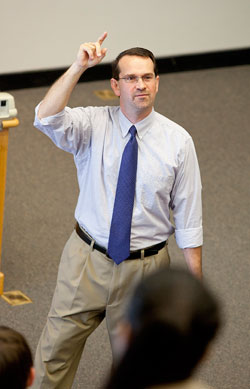Wright immerses students in study of social movements
Social movement organizations play an important role in shaping public policy, media coverage and citizen’s perceptions of important issues, but rarely do students take the time to get to know these groups or the people who make them run.
To fill that gap, Strategic Communication Professor Thomas Wright developed the General Education course “Contemporary American Social Movements,” which offers Temple students a chance to learn more about how the organizations impact society. The class exposes students to a wide range of viewpoints brought forth from organizations ranging from the American Civil Liberties Union to local Tea Party chapters.
“I provide my students with the background and theoretical information they need to understand the actions of social movement organizations, and practitioners help them understand how they incorporate theory into the real world,” said Wright.
The course is an extension of Wright’s work in helping students from throughout the university become more active in civic life.
In recognition of his efforts, he is being honored with the Provost’s Award for Innovative Teaching in General Education.
Wright assigns two projects that require students to connect with a local organization. The first is an organizational profile, covering everything from the organization’s funding streams to their use of the internet and social media. After students profile an organization, they interview a representative of the group to learn about their day-to-day activities.
“I want my students to get out of the classroom and into the field,” said Wright. “I want them to hear first-hand information about the challenges and successes of local and regional organizations.
“When teaching about social movement organizations, you have to stay current and engaged,” he adds. “Students often don’t understand references to previous presidential campaigns or movements from the 90’s, so innovation is crucial.”
“It’s heartening to see a student come into the course with little to no interest in issue advocacy or politics and leave with an appreciation of what these organizations do and a desire to get involved advocating for a cause which they believe in.”
